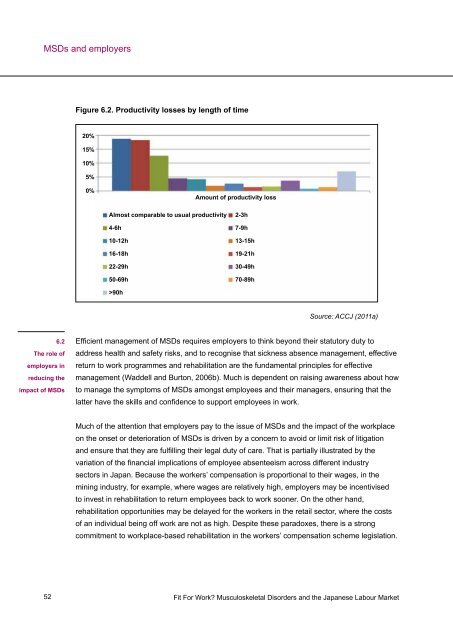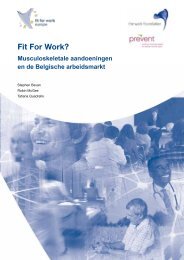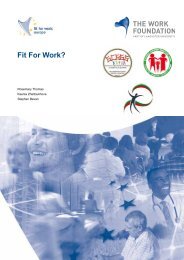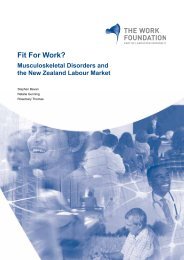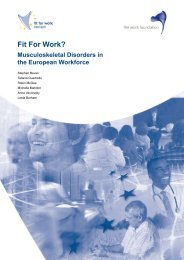English version - Fit for Work Europe
English version - Fit for Work Europe
English version - Fit for Work Europe
Create successful ePaper yourself
Turn your PDF publications into a flip-book with our unique Google optimized e-Paper software.
MSDs and employers<br />
52<br />
6.2<br />
The role of<br />
employers in<br />
reducing the<br />
impact of MSDs<br />
Figure 6.2. Productivity losses by length of time<br />
20%<br />
15%<br />
10%<br />
5%<br />
0%<br />
Almost comparable to usual productivity<br />
4-6h<br />
10-12h<br />
16-18h<br />
22-29h<br />
50-69h<br />
>90h<br />
Amount of productivity loss<br />
2-3h<br />
7-9h<br />
13-15h<br />
19-21h<br />
30-49h<br />
70-89h<br />
Source: ACCJ (2011a)<br />
Efficient management of MSDs requires employers to think beyond their statutory duty to<br />
address health and safety risks, and to recognise that sickness absence management, effective<br />
return to work programmes and rehabilitation are the fundamental principles <strong>for</strong> effective<br />
management (Waddell and Burton, 2006b). Much is dependent on raising awareness about how<br />
to manage the symptoms of MSDs amongst employees and their managers, ensuring that the<br />
latter have the skills and confidence to support employees in work.<br />
Much of the attention that employers pay to the issue of MSDs and the impact of the workplace<br />
on the onset or deterioration of MSDs is driven by a concern to avoid or limit risk of litigation<br />
and ensure that they are fulfilling their legal duty of care. That is partially illustrated by the<br />
variation of the financial implications of employee absenteeism across different industry<br />
sectors in Japan. Because the workers’ compensation is proportional to their wages, in the<br />
mining industry, <strong>for</strong> example, where wages are relatively high, employers may be incentivised<br />
to invest in rehabilitation to return employees back to work sooner. On the other hand,<br />
rehabilitation opportunities may be delayed <strong>for</strong> the workers in the retail sector, where the costs<br />
of an individual being off work are not as high. Despite these paradoxes, there is a strong<br />
commitment to workplace-based rehabilitation in the workers’ compensation scheme legislation.<br />
<strong>Fit</strong> For <strong>Work</strong>? Musculoskeletal Disorders and the Japanese Labour Market


